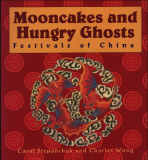
Mooncakes and Hungry Ghosts
Festivals of China
By Carol Stepanchuk and Charles Wong1992, 145 pages, paperback.

 |
Mooncakes and Hungry Ghosts
By Carol Stepanchuk and Charles Wong |
ORDER -- Item #3102, Price $14.95
The appendix includes a calendar with short descriptions of all the major birthdays and festivals, a glossary, a list of cultural items and practices for celebrating some of the festivals, a glossary of Chinese words and names, and a complete bibliography of the sources for the book.
Journeying from event to event, what we realized (as festival observers, participants, mythologists and anthropologists have through the ages) is that to experience a festival in all its fanfare and commotion, you are required to set aside all day-to-day worries and cares in favor of a mood of make-believe and masquerade. For a time-as in the primitive world of gods and demons where the festivals of today have their roots- we play the game of "as if," freeing our mind and spirit, dissolving the laws of time and space, standing on the borderline between belief and disbelief.
Throughout the year, people around the world reenact the rituals practiced by their parents, grandparents, and earlier ancestors. Whether it's Native American mountain spirit dancing or the lively costumed balls of the Mardi Gras, we still commemorate occasions in much the same way as in the ancient past through special costumes, makeup and ornamentation, enhancing the mood further by music, feasting, and sharing. Celebrations and festivals are necessary for society and for the individual-they are about cultural identity, life transitions, and personal discovery.
One of the best and most enjoyable ways to learn about a culture is by participating in its living festivals, and in pre-1949 China, and still in Hong Kong, Taiwan, and the overseas Chinese communities, festivals dominate the traditional calendar. Every month there are public festivals or domestic ceremonies, sensational birthday celebrations for the gods, or seasonal religious rites. These events may commemorate historical figures or mythical beings. In some cases, they are for the purpose of worshiping ancestors and deities. In other cases, they are for safeguarding the year and praying for prosperous times ahead. In all cases, holidays unite individuals by bringing families and friends together to celebrate and to share in their communal heritage and personal memories.
Book Description
A comprehensive book of the major festivals of China and Chinese culture. Some of the festivals described in the book include New Years, Dragon Boat, Mid-Autumn Moon, Clear Brightness, Feast of the Hungry Ghosts, and many more.Text from the Introduction
One of the Chinese words that comes to mind when you are watching or participating in Chinese festivals is renao, meaning "noisy, flourishing, lively and animated." It is used to describe the sensational and exciting aspects of celebrations and gatherings-the blazing color, the ear-splitting din, the long-awaited festival foods, the colorful street performances. There isn't any word in the English language that really comes close to the delightful sense of disorder and boisterousness which is a part of Chinese festivals.
Background on Carol Stepanchuk
Author Carol Stepanchuk's interest in Chinese folk culture and celebrations began when she was a student of Chinese at the University of Massachusetts and the University of California at Berkeley. She has lived and traveled in Taiwan and the People's Republic of China, and has pursued her fascination with Chinese art and religion through her work at San Francisco's Asian museums, cultural centers and galleries. She resides in California, where she is a free lance writer and multi-cultural educator.Background on Charles Wong
Born in Amoy, China, author Charles Wong was educated in China at the Beijing Institute of Foreign Languages and is a graduate of Swarthmore College. He has maintained a deep interest in traditional Chinese culture, and currently works as an editor, free lance writer, and translator in San Francisco.
About |
Contact |
New |
Specials |
Browsing |
Ordering |
Conference |
Links |
Help
Copyright © 2002 by AACP, Inc.
Most recent revision September 7, 2002